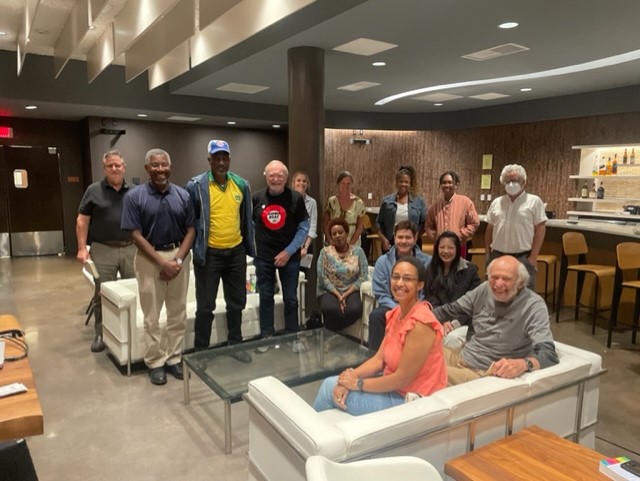
The Jazz St. Louis Book Club, with author Gerald Early, second from left.
Over a half-dozen years ago, at least, I proposed to Gene Dobbs Bradford, then the executive director of Jazz St. Louis, and Phil Dunlap, the organization’s education director, to launch a book club. I am not sure what made me want to do it. It was not as though I lacked enough things to do. Perhaps it was a sense of guilt. I was a member of Jazz St. Louis’s board of trustees, but I never attended meetings. That, I have discovered, is an excellent way to be dismissed from a board, but Jazz St. Louis seemed adamant to have me around. I was not a significant financial contributor, no angel with or without wings. At a certain point, I felt I needed to contribute something, and, after all, I had gained the reputation in St. Louis, thanks to Ken Burns’s 2001 jazz documentary, of being, if not a jazz expert than a sort of Hemingway-esque aficionado, one who knows the bloodlines of this music, so to speak, as one might know the bloodlines of horses and bulls in the bullfighting arena. That was more than enough.
Well, it is not quite true that I had done nothing worthwhile during my years of involvement with Jazz St. Louis. For a few years, I won NEH Summer Institute grants for schoolteachers, hosting a course on how the teachers could use jazz in their curriculum (jazz as social history, jazz in film, jazz as a cultural expression, and such topics). Jazz St. Louis was awarded a portion of those grants to bring in musicians for the summer and the club, Jazz at the Bistro, was a site for instruction every week as the teachers were given the opportunity to talk to professional jazz musicians about their craft and their careers and, in the evening, listen to a performance. But after a few years, I was exhausted doing this every summer, so I stopped. Exhaustion breeds inertia and that was sort of the state I was in when I proposed the book club. It was a way to snap my mind back, to re-engage with myself and with jazz. Besides, if it did not work, I was no worse off than before.
Gene and Phil took to the idea right away. The club would meet for eight months of the year (not convening in June, July, August, and January). I would conduct the group in reading one book every month—a biography, history, autobiography, novel, short story—that dealt with jazz. There was a bit of concern if there would be enough books to keep the club going; I told them there was no shortage of books about jazz (there truly is not; jazz has been thoroughly, almost numbingly, written about), and that, occasionally, we can use a book that deals with another musical genre, for variety’s sake. And so the club was born.
I have no idea what the first book was that launched the club but I do remember that a lot of people came to that first meeting, maybe fifty or sixty. We have never had that many again. I think so many came at first because they thought I was going to lecture but were a bit disappointed when they learned that it was, as most book clubs are, a discussion. I thought I would be committing a crime against myself by lecturing about a different jazz book once a month! We have sometimes had authors as guests such as Ashley Kahn and Sherrie Tucker. But most months it is I and whoever shows up, sometimes as many as fifteen or, as during the pandemic months especially, as few as two. Yes, Jazz St. Louis kept the club going via Zoom during the pandemic, although in my heart I wanted to chuck it. As the old saying goes, the good Lord hates a coward and so, as the organization was willing, I soldiered on as if on automatic pilot. We have a small core of regulars and I have always been grateful to them for continuing to support the club. Sometimes people have read the book, sometimes not. I do remember one book that most people read cover-to-cover and that was bandleader Stan Kenton’s daughter’s book about her relationship with her father (Love Affair by Leslie Kenton), which included episodes of incest. Most approached the book with great skepticism but came away convinced that Kenton did, indeed, have sex with his daughter.
At first, Jazz St. Louis wanted to pay me for doing this, a stipend or tickets to concerts. I chose not to accept this, not from any sort of virtue signal (I am about as virtuous as I can afford to be and no more), but because any sort of compensation defeated the purpose of starting the club as a contribution to the organization. There was another reason as well: people in the organization as well as the public, as far as they knew, would be convinced that I believed in the club, and they would be compelled to believe in my belief. Having people believe in you is far more important than compensation.
